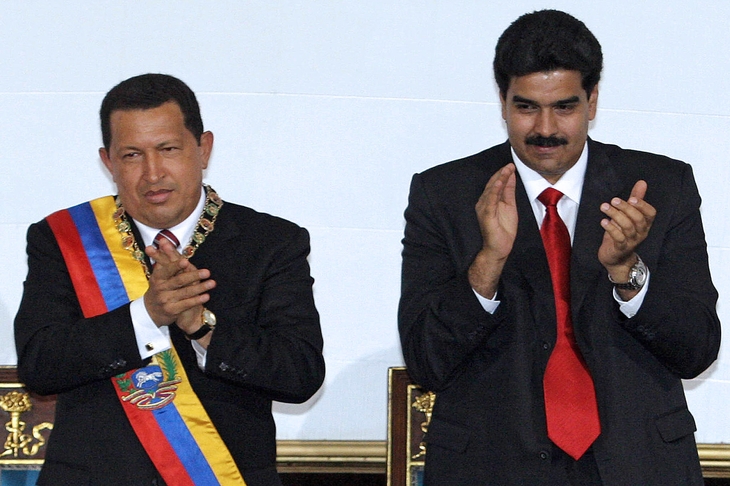Hugo Chavez’s apologists are at it again. Venezuela’s little local economic difficulties are nothing to do with him, you’ll understand. It’s his successor, Nicolas Maduro who’s to blame. Chavez was a good guy, who lifted people out of poverty and made a more equal country. Jeremy Corbyn is right to hold him up as a hero.
Nowhere was this narrative spun more strongly than on yesterday’s Today programme. In an item which sounded as if it might have been edited by Corbyn central command, we were told that Hugo Chavez used his country’s oil wealth to ‘reduce inequality and improve the lives of the poorest citizens’. Chavez’s former oil minister was then interviewed, and claimed that Maduro was a ‘traitor of the Chavez legacy’. Interviewer Justin Webb did nothing to question this claim.
Nicolas Maduro is no traitor of Hugo Chavez. If anything Chavez’s chosen successor has done his mentor proud – and continued the reforms which Chavez himself would have continued had he not succumbed to cancer in 2013. The only difference is that while Chavez’s debilitating influence on the Venezuelan economy was masked by a high oil price, his successor has not been so lucky. It is fortunate for Chavez’s legacy that he died just in time before global oil prices collapsed and exposed an economy in which business incentives had been destroyed and foreign investors repelled.
It is true that Chavez did not inherit a healthy economy. In 1970, Venezuela was one of the 20 richest countries in the world with a GDP per head higher than that of Spain. Falling oil prices in the 1980s put paid to that, and while economic liberalisation by then President Carlos Andres Perez in 1989 led to a short upswing, Venezuela continued to suffer high inflation and poor growth throughout the 1990s.
Just as he was fortunate to die – in one sense – just before the oil price collapse, Chavez was equally fortunate to arrive in office, in February 1999, just before an upswing in oil prices. That led to a couple of boom years before a deep recession in 2002/03. Thereafter, the Venezuelan economy grew until the global recession of 2009, but not at an impressive rate. Over the Chavez years growth averaged 2.8 per cent per year, compared with a Latin American average of 3.3 per cent.
Poverty did fall during his years in office – with the poverty rate falling from 49 per cent in 1999 to 27 per cent in 2011. But again, the last couple of years aside, this coincided with a strong period of global growth and falling levels of poverty all over the world. Over Latin America as a whole, poverty fell from 44 per cent to 32 per cent. In Peru, which did not have a socialist leader feted by the international Left, the poverty rate fell from 55 per cent to 31 per cent.
Meanwhile, Chavez was setting in motion the reforms that would eventually lead to the destruction of his nation’s economy. He fixed the prices of food and other essentials, destroying native industries in the process. The expropriation of property frightened off investors. In 2011, Latin America saw $150 billion worth of overseas investment. Venezuela’s share of this was just $5 billion. Although modest compared with subsequent events, inflation surged to over 20 per cent and the Bolivar plummeted. By the end of Chavez’s time in government the Venezuelan economy was more dominated than ever by a state-run oil company just waiting to be knocked sideways by a downturn in global oil prices. During Chavez’s time in office the share of exports made up by oil grew from 77 per cent to 96 per cent.
Chavez’s apologists saw none of this. In a paper for the US think tank, the Center for Economic Policy Research, in 2008, for example, Mark Weisbrot and Luis Sandoval scorned ideas that the oil boom was headed for bust, declaring: ‘at present it does not appear that the current economic expansion is about to end any time in the near future.’
No leader of Venezuela carrying out the policies of Hugo Chavez could have avoided the inevitable. I don’t see any need to defend Nicolas Maduro, but no-one should fall for the spin that he has ruined a golden legacy of Hugo Chavez. That legacy was always going to be ruinous.







Comments